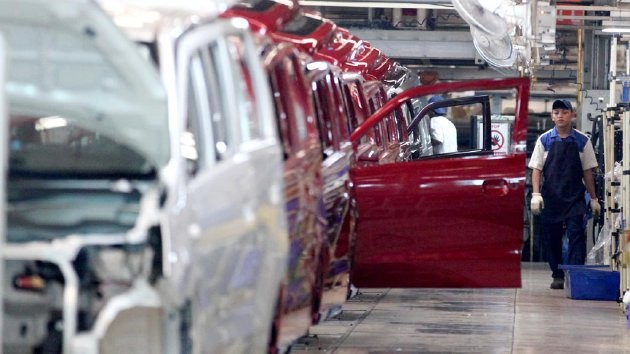High taxes, low-emission standard hampering automotive exports
Change Size
 Vehicles are being assembled in an automotive assembly line in Bekasi, West Java. (Kompas/Totok Wijayanto)
Vehicles are being assembled in an automotive assembly line in Bekasi, West Java. (Kompas/Totok Wijayanto)
T
he high taxes on sedan and low-emission standard (Euro 4) vehicles running on Indonesian roads are hampering Indonesian automotive manufacturers from expanding into other export markets, an industry expert has said.
Indonesia still imposed a 30 percent tax for sedans, which forced manufacturers to limit sedan production and import the model from India and Thailand, said Association of Indonesian Automotive Manufacturers (Gaikindo) secretary-general Kukuh Kumara.
The government only imposed a 10 percent on other types of passenger cars such as multi-purposed vans (MPVs), but such models were not in demand in markets abroad, he added.
(Read also: Toyota Indonesia to see exports down by 5 percent this year)
"We have an opportunity to export to Australia because in 2017 the country will cease producing sedans. They have an annual market of 1.2 million units [of passenger vehicles], but they want sedan and double-cabin [vehicles], not MPVs," he said during a press briefing in Jakarta on Wednesday.
Thailand, which manufactured sedans and double-cabins, would take this opportunity, he said.
Another issue is that since 2005 Indonesia still uses the Euro 2 emission standard. Meanwhile, many other countries have already adopted the Euro 4 standard, where only 3 countries in Asia including Indonesia have not upgraded to the latest benchmark.
"It does not mean that local manufacturers cannot produce Euro 4-standard engines, but for costs, it is more efficient if we only produce one type of engine for both the domestic and export market," Kukuh said.
However, local implementation of Euro 4 depended on suitable fuel availability. State oil and gas company Pertamina earlier stated that it could supply Euro 4 fuels only by 2023, he added. (bbn)









